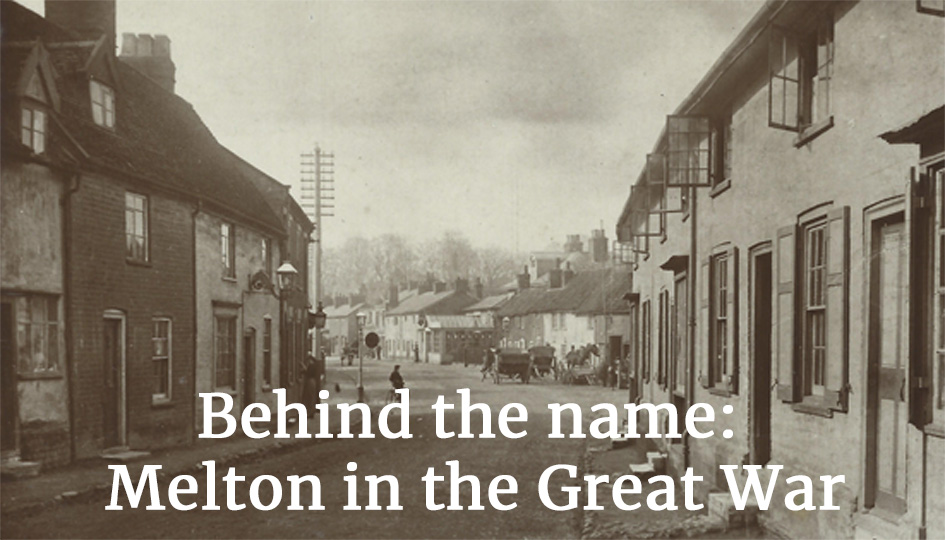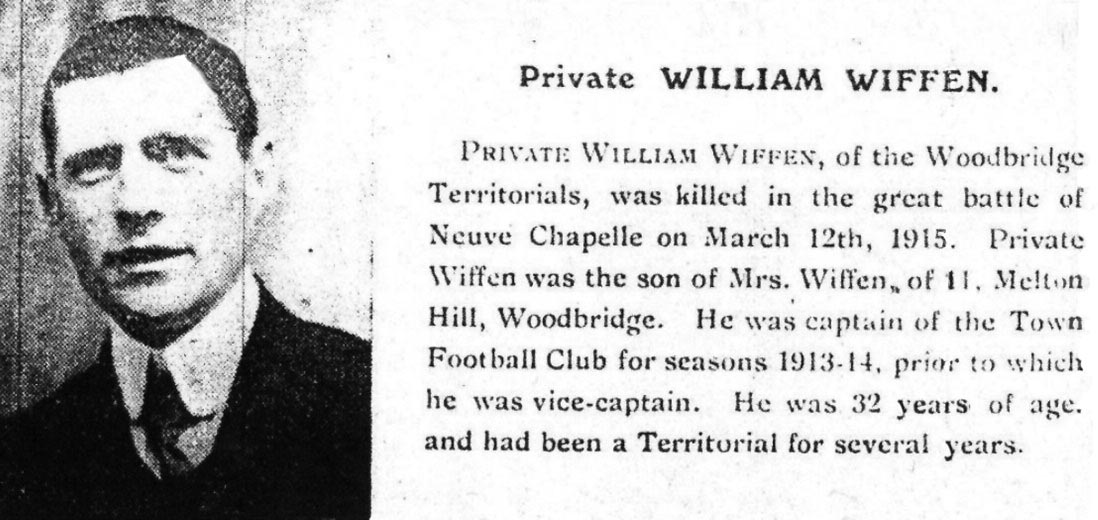William Henry Wiffen was the eldest son of James and Hannah (née Baxter). He was born in Melton in the summer of 1883. William had three sisters, Edith, Ellen and Amy and two younger brothers, James and Charles. In 1891, James senior worked as a bricklayer, William attended school and the family were living together on Melton Road. By 1901, the family had moved to 18 Prospect Place and William, aged seventeen, worked as a general labourer.
In 1910, James senior died and the family moved to 11 Prospect Place. Hannah was left to bring up James junior and Charles; William became the primary breadwinner for the family. By this time, William was working as a bricklayer at St Audry’s Hospital and was engaged to Annie Wright, a waitress at the Bull Hotel on Market Hill, Woodbridge. In his spare time, William played in goal for Woodbridge Town Football Club and for the 1913-14 season he was captain. He was also a member of the Woodbridge Company of the 4th (Territorial) Battalion, Suffolk Regiment, having joined in 1908.
On 2nd August 1914, the 4th Battalion was in Great Yarmouth for their annual training camp. William, however, was prevented from joining them due to a foot injury. When war was declared, the 4th Suffolks went to their war station at Felixstowe before being moved to Colchester. The recovering William joined his company in Colchester and worked in the cookhouse.
The battalion received their mobilisation orders and, on 6th November 1914, they marched to St Botolph’s Station, Colchester and entrained for Southampton. After a day in a rest camp, the battalion boarded the SS Rosetti, arriving in Le Havre the afternoon of the 9th November. William and the battalion were sent to St Omer where they underwent training for mobile warfare. It was not until 11th December that one company of the 4th Suffolks found themselves in trenches at La Bassée. Ten days later, William and the 4th Suffolks were once again on the front line taking part in The Defence of Givenchy. In March 1915, the 4th Suffolks were in billets at Richebourg St Vaast, preparing for what was to become the Battle of Neuve Chappelle, when they were posted to the front line earlier than expected. Their orders were to relieve and disarm a company belonging to the 58th Vaughn Rifles, an Indian infantry battalion, from whom fifteen members had deserted to German lines. The war diary for 3rd March says:
‘About 100 Afridi from 58 Rifles were escorted back to Richbourg by No 4 Company, who had previously disarmed them, until they were handed over to other troops.’
A week later, on 10th March, the 4th Suffolks moved to the front line at Vielle Chappelle in readiness for an attack on the German trenches at Neuve Chappelle. Before they could get involved in the fighting, however, the battalion was sent back to billets as news filtered through that the German trenches had been taken. The following day, they were back on the front line preparing to support the troops who had captured the trenches. Upon arrival, the battalion consolidated their position and dug-in, awaiting further instructions. When the orders came, the 4th Suffolks discovered they were to withdraw – the order was unexpected due to their strong position. The order was queried in case it a was a “ruse de guerre” from the enemy, but the instructions were confirmed, and withdrawal commenced. Moving in darkness and under heavy, enemy artillery fire, William and the battalion arrived back at their billets with many casualties.
Enemy artillery fire continued after that, forcing the troops to evacuate the houses in which they were quartered and move once more into trenches. Shortly before dawn on 12th March, they were ordered back to the position they had left only hours before. As soon as they set off, the 4th Suffolks came under an intense enemy artillery barrage that caused further casualties and effectively stopped the advance in its tracks. Once more orders were received to push forward and to be ready to make an attack on the enemy trenches at 11:00 from a position known as ‘the Orchard’. By the time the 4th Suffolks had reached their destination, they had been reduced to just one hundred and seventy-three men.
The 4th Suffolk’s war diary says of the battle:
10:45; Arrived at the Orchard but finding the battalion reduced to 173 men the C.O. reported to the General who reduced our frontage from 225 to 100 yds and ordered the 59th Rifles (59th Scinde Rifles, Indian Army) to fill the gap on our right. The men were to hold off into 3 lines, the front line taking its position ready to advance with the 2nd and 3rd line in the rear. At 11:00 just as the advance was about to commence, the order came that the attack was delayed by 2 hours.
13:00; The advance commenced and the front line gradually moved forward until it reached the 2nd line of trenches, the 2nd line also got to the same position, the 3rd line remaining in the trenches immediately behind. Again the attack was delayed by the division on the left.
17:00; Another attack was made by the troops on the left on the enemy’s front line and severe fighting took place. The enemy was driven back, but by this time it was dark and no advance was made.
19:00; Received orders to remain in our positions for the night. Our casualties during the day were 1 Officer killed and 5 wounded, 7 NCOs and men killed, 84 wounded and 3 missing.
13th March, 01:00; We received orders to be ready to move out at 04:15, as we should be relieved in the trenches at 04:30.’ Once back in billets, the 4th Suffolks took stock: the casualty count stood at two hundred and seventeen officers and men killed, missing or wounded.
One of those killed was William Wiffen. Reports of the casualties affecting the 4th Suffolks at the Battle of Neuve Chappelle – a landmark battle that marked the first time the German army had been forced back from an established position – filtered back to Melton and Woodbridge and their worst fears were confirmed. On the 25th March 1915, the Woodbridge Reporter and Wickham Market Gazette carried the news of William’s death:
Woodbridge Territorials Killed Captain of Town Football Club
During the week rumours have been current that the casualty list in conjunction with the great battle of Neuve Chappelle, in which the 4th Suffolks were engaged, including some Woodbridge Territorials and the friends of our men at the front have awaited official news with the greatest possible anxiety. Unfortunately, the reports have proved only too true, for on Monday morning Mrs Wiffen of 11 Melton Hill received the sad news that her son, Private William Wiffen, had been killed in action. The information came by a letter from Captain Clarke, the commanding officer of the Woodbridge and Framlingham half companies, to Major H. C. Edwards, who broke the news to Wiffen’s mother, who is a widow, having lost her husband about three years ago. She is grief-stricken at the loss of her son, who has been her main support during her widowhood, and in every respect has been a most dutiful and loving son. Wiffen will be remembered as goalkeeper for the Town Football Club, a position which he filled with much success. He was captain of the team for season 1913-14, prior to which he was vice-captain. He was formerly a member of Seckford Chapel Choir. By trade he was a bricklayer, and had been in the employ of the authorities of the Suffolk District Asylum at Melton for many years. Wiffen, who was 32 years of age, has been affianced to Miss Wright, waitress at the Bull Hotel, who is deeply distressed at his loss, their engagement having existed for the past six years. Pte. Wiffen had been a Territorial for several years, and previous to the mobilisation last August when the war broke out, had been ill for nine weeks, owing to an operation to his foot. He was stationed at Colchester, where he acted as cook to his company, until Nov. 9th, when he proceeded to the front with the 4th Suffolks. His mother last saw him when she spent the Sunday at Colchester with him, prior to him leaving with his regiment the following Friday. A memorial service will be held at Melton Church on Sunday evening at 6.30 p.m.
The Memorial Service for William took place on Sunday 28th March at St Andrew’s Church and was reported in the same paper:
Mrs Wiffen of Melton Hill has received official notification of the death of her son Pte. William Wiffen, who was killed in action at Neuve Chappelle on the 12th March. A memorial service was held at Melton Church on Sunday evening attended by a crowded congregation. The Excelsior Band, connected with the Woodbridge Territorials was represented by several members. A very forceful and impressive sermon was preached by the Rector, Rev Orpen, which deeply touched the feelings of the congregation.
William’s body was not recovered. He is remembered on the Le Touret Memorial in the Le Touret Military Cemetery near Richebourg, France. For his war service, William’s family received his 1914 Star and the British War and Victory Medals.

